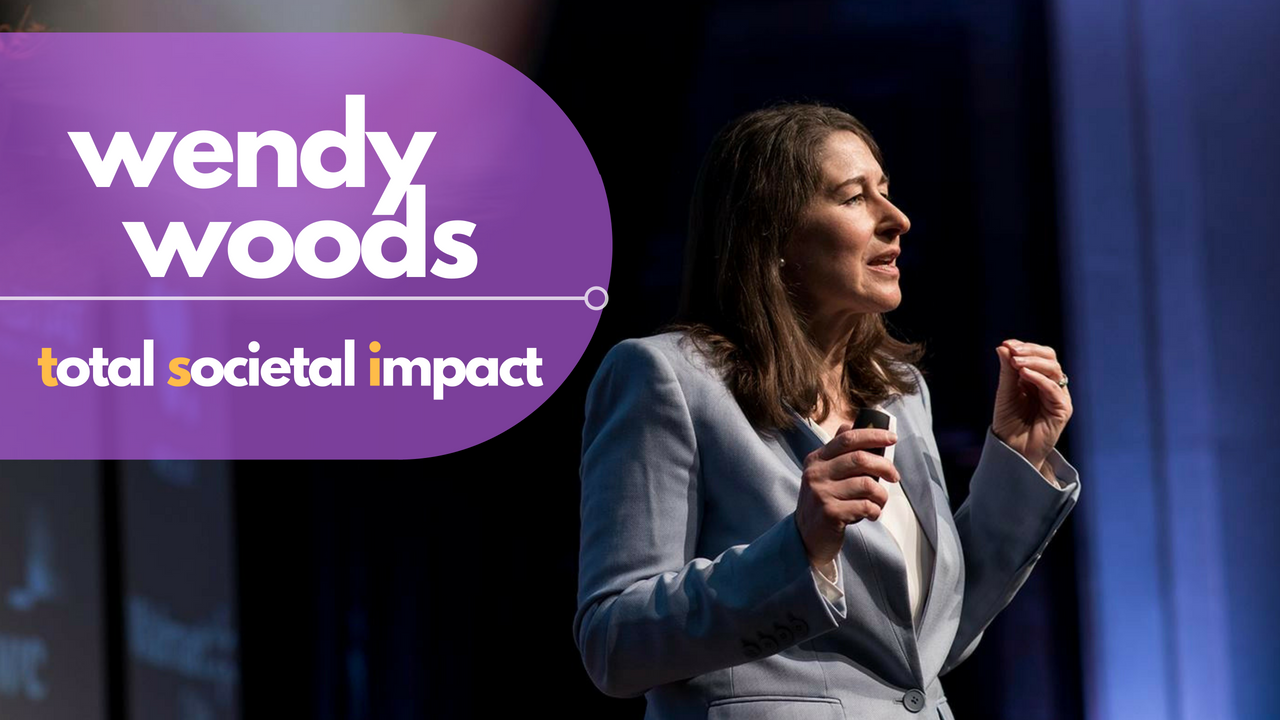- Wendy Woods argues that Corporate Social Responsibility isn’t enough, as it’s typically a “route for corporate generosity”
- She proposes the concept of Total Societal Impact (TSI) as a way to weave social and environmental considerations into the business model
- The All Good Work Foundation is an example of how TSI can be implemented in the flexible workspace industry
Is Corporate Social Responsibility (CSR) enough? For Wendy Woods, a social impact strategist, the answer is no.
That’s because of the way CSR is implemented. In most cases, it’s a program that’s bolted onto an organization “as a route for corporate generosity”. It’s a step in the right direction, but it’s not designed to scale and during difficult times, it’s often the first program to be cut or downsized.
To really root out the biggest problems in the world today, businesses need to get innovative. For Woods, that means flipping CSR thinking on its head and switching to TSI — Total Societal Impact.
“If we’re going to make lasting and significant progress in the big challenges in our world, we need business, both the companies and the investors, to drive the solutions,” Woods explained during a TED talk in October 2017 entitled ‘The Business Benefits of Doing Good’.
In short, TSI incorporates social and environmental considerations into the business model. It’s about weaving these considerations right into the fabric of the organization, so they become much more than a gesture of generosity; they become a fundamental part of the business.
Here’s an example as cited by Woods:
Chocolate giant Mars, the sixth-largest private company in the US, relies heavily on the production and importation of cocoa. The sustainability and availability of cocoa supplies is a growing concern for some, but Mars has found a way to keep supplies constant by partnering with NGOs around the world that work with small shareholder farmers. Those NGOs help farmers to improve crop yields and make sure that they get a fair, premium, liveable wage. They also help minimize negative effects on the environment, like deforestation. Not only is Mars helping to improve the quality of life for farming communities, the company has also solved a significant risk in its supply chain.
This is an example of how TSI works, by becoming an active part of the business. It actually supports the company and even plays its part in generating profit — in this case, by building a sustainable supply chain.
How can this thinking be applied to the flexible workspace industry?
There are countless ways in which positive social impact can be applied to a business, given the many different supply channels on which it relies. Take the All Good Work Foundation as an example. Here are 3 ways in which the Foundation is working to make a positive impact on social causes through the flexible workspace industry:
1. As a nonprofit organization, All Good Work connects social impact organizations with workspace that has been donated by flexible workspace companies. It helps charitable organizations within the social impact sector to actively fast-track their growth opportunities by reducing workplace costs, and giving them access to an established community of professionals, where they can connect with other members for support, inspiration, and new business opportunities.
2. Workspace operators that donate space to All Good Work and accommodate social impact organizations are actually growing their business by expanding their membership. Some benefits of accommodating a social impact organization — such as enriching their coworking community — may not directly impact their bottom line. But in many cases, the workspace stands to gain financially, as those organizations help to raise awareness of the space and bring new footfall in the form of sponsors, investors and other stakeholders. Organizations will often make additional purchases too, such as meeting room bookings.
3. All Good Work recently launched All Good Coffee, which supplies coffee to coworking spaces. Similar to the Mars example, All Good Coffee works directly with farming cooperatives to ensure they receive a fair price for their produce, which helps improve their quality of life and lift farming families out of poverty. Furthermore, 100% of the profits go back into the All Good Work Foundation.
This way of thinking is multi-faceted, and companies often develop a portfolio of activities focusing on positive social impact. As a workspace operator, you might donate space to nonprofit organizations that work on the causes you care about. Another is providing ethically-sourced coffee. But it’s also about how you conduct your business; for example, spaces opening their doors to people who have been displaced after a natural disaster.
Above all, this approach can actually create business benefits for the company while developing meaningful and sustainable solutions to problems in our world today.
Dig deeper into TSI with BCG’s report, ‘Total Societal Impact: A New Lens For Strategy’
Watch the TED talk by Wendy Woods here:



 Dr. Gleb Tsipursky – The Office Whisperer
Dr. Gleb Tsipursky – The Office Whisperer Nirit Cohen – WorkFutures
Nirit Cohen – WorkFutures Angela Howard – Culture Expert
Angela Howard – Culture Expert Drew Jones – Design & Innovation
Drew Jones – Design & Innovation Jonathan Price – CRE & Flex Expert
Jonathan Price – CRE & Flex Expert













